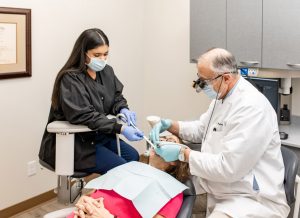Safeguarding Smiles
Safeguarding your oral health and restoring your tooth’s function are paramount concerns in modern dentistry. At Pinnacle Dental, we want you to know about a versatile and dentist-approved solution – glass ionomer fillings. These innovative dental materials provide numerous benefits for your dental restoration needs, making them an excellent choice for various applications.
Schedule your appointment at Pinnacle Dental to learn about the types of dental fillings we offer. Contact our dentist in Farmington, CT, today by calling (860) 470-3660.
What Are Glass Ionomer Fillings?
Glass ionomer fillings, also known as glass ionomer cement, are a type of dental restorative material used to repair decayed teeth, fill cavities, and replace old fillings. They’re made from a unique combination of glass powder and an organic acid, such as polyacrylic acid. One of their key advantages is their ability to form a chemical bond with the tooth structure, ensuring a secure and long-lasting restoration.
Types of Glass Ionomer Fillings
There are several types of glass ionomer fillings available, each with its own unique properties and applications:
- Conventional Glass Ionomer: Conventional glass ionomer fillings are self-cured and have been used for many years in dentistry. They’re suitable for various applications, including small to medium-sized cavities.
- Resin-Modified Glass Ionomer: Resin-modified glass ionomer fillings combine the benefits of traditional glass ionomers with resin-based materials, offering improved strength and aesthetics. They’re often preferred for restorations in visible areas.
- Compomer (Composite-Glass Ionomer Hybrid): Compomers are a hybrid material that combines the benefits of composite resins and glass ionomers. They provide better aesthetics than traditional glass ionomers and are suitable for small to medium-sized cavities.
Glass Ionomer Fillings: Uses and Applications
Glass ionomer fillings are versatile and can be recommended by your dentist for various dental applications, including:
- Small to Medium-Sized Cavities: Glass ionomer fillings are particularly suitable for repairing small to medium-sized cavities in both adult and pediatric patients.
- Root Surface Cavities: They can be used on root surfaces to treat cavities caused by gum recession or root exposure.
- Pediatric Dentistry: Due to their fluoride-releasing properties and ease of application, glass ionomer fillings are commonly used in pediatric dentistry, particularly for baby teeth.
- Non-Stress-Bearing Areas: They’re ideal for non-stress-bearing areas of the mouth, such as the front teeth and some premolars.
Advantages and Disadvantages of Glass Ionomer Fillings
Advantages
Glass ionomer fillings offer numerous benefits that make them a desirable choice for dental restorations:
- Natural appearance and translucency
- Fluoride release aids in cavity prevention
- Minimal tooth preparation is required
- Suitable for non-stress-bearing areas
- Biocompatible and well-tolerated by tissues
Disadvantages
While glass ionomer fillings offer many advantages, it’s essential to be aware of their limitations:
- Limited durability compared to some alternatives
- Sensitive to moisture during placement
- Weaker than materials like amalgam
- Aesthetic limitations in highly visible areas
The Glass Ionomer Filling Procedure
The glass ionomer filling procedure begins with a thorough dental examination and diagnosis, followed by tooth preparation and dental sedation to ensure comfort. The decayed portions of the tooth are removed, and the glass ionomer material is mixed and applied to fill the cavity, with optional light curing to enhance durability.
After shaping and polishing the filling for a natural appearance, patients are advised on oral hygiene and dietary precautions. Regular follow-up appointments may be scheduled to maintain the filling’s integrity. Glass ionomer fillings are favored for their fluoride-releasing properties and suitability for certain dental applications.
Costs
The cost of glass ionomer fillings typically falls between $75 and $200 per filling. While they are generally less expensive than composite fillings, they may be more costly than traditional amalgam fillings. Factors such as the size and location of the cavity, as well as your dental insurance coverage, will influence the total cost.
Frequently Asked Questions
Glass ionomer fillings have a moderate lifespan, typically lasting between five to 10 years. However, their longevity can vary depending on factors like the location of the filling, oral hygiene practices, and the specific type of glass ionomer material used.
Yes, glass ionomer fillings are generally considered safe for dental use. They’re biocompatible, which means they’re well-tolerated by the body. Additionally, they release fluoride, which can help prevent tooth decay.
Both glass ionomer and composite fillings have their advantages and disadvantages. While composites may offer better aesthetics and durability, glass ionomers release fluoride, which helps prevent tooth decay and strengthen the tooth structure. The choice between the two depends on the specific dental application and your dentist’s recommendation.
Contact Dr. Kuzmin Today to Learn About Your Options
Ready to say goodbye to tooth decay? Contact Pinnacle Dental today to learn more about your dental filling options. To schedule a consultation, call Dr. Kuzmin, a top-rated dentist in Farmington, at (860) 470-3660. We’re proud to serve patients living in Plainville, New Britain, Hartford, and Newington, CT!

